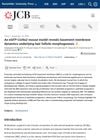 51 citations,
June 2021 in “Signal Transduction and Targeted Therapy”
51 citations,
June 2021 in “Signal Transduction and Targeted Therapy” The document concludes that while there are promising methods to control CRISPR/Cas9 gene editing, more research is needed to overcome challenges related to safety and effectiveness for clinical use.
 38 citations,
January 2014 in “International Journal of Endocrinology”
38 citations,
January 2014 in “International Journal of Endocrinology” Adrenal disorders can cause lasting brain and behavior issues in children.
 10 citations,
May 2012 in “PloS one”
10 citations,
May 2012 in “PloS one” Low ERCC3 gene activity is linked to non-pigmented hair growth.
 1 citations,
July 2023 in “Nature communications”
1 citations,
July 2023 in “Nature communications” MOF controls key genes for skin development by regulating mitochondrial and ciliary functions.
 223 citations,
September 2018 in “Rheumatology”
223 citations,
September 2018 in “Rheumatology” JAK inhibitors are effective in treating various immune-related diseases, not just rheumatoid arthritis.
 November 2023 in “bioRxiv (Cold Spring Harbor Laboratory)”
November 2023 in “bioRxiv (Cold Spring Harbor Laboratory)” Scientists made a mouse that shows how a specific protein in the skin changes and affects hair growth and shape.
 25 citations,
June 2018 in “Journal of The American Academy of Dermatology”
25 citations,
June 2018 in “Journal of The American Academy of Dermatology” Genes linked to fibrosis are more active in people with central centrifugal cicatricial alopecia.
 60 citations,
February 2013 in “Cell reports”
60 citations,
February 2013 in “Cell reports” The balance between androgen receptor and p53 is crucial for sebaceous gland differentiation.
 March 2024 in “Cell communication and signaling”
March 2024 in “Cell communication and signaling” Lack of sleep in mice leads to prostatitis by reducing certain hormones and activating an inflammatory pathway, which can be temporarily fixed with normal sleep.
 4 citations,
December 2022 in “Advanced science”
4 citations,
December 2022 in “Advanced science” SCD1 is important for hair growth by keeping the connection in skin cells where hair stem cells live stable.
January 2024 in “Animals” SP1 promotes and KROX20 inhibits hair cell growth by affecting the CUX1 gene.
 January 2025 in “Frontiers in Cell and Developmental Biology”
January 2025 in “Frontiers in Cell and Developmental Biology” Hox proteins help maintain keratinocyte identity by regulating miRNA expression.
July 2024 in “International Journal of Molecular Sciences” RF-based therapies might help treat hair loss.
 54 citations,
January 2023 in “Signal Transduction and Targeted Therapy”
54 citations,
January 2023 in “Signal Transduction and Targeted Therapy” New therapies are being developed that target integrin pathways to treat various diseases.
 5 citations,
November 2022 in “Animal Genetics”
5 citations,
November 2022 in “Animal Genetics” Genomic research can help improve the quality and production of natural fibers in animals.
 4 citations,
April 2022 in “Dermatologic Therapy”
4 citations,
April 2022 in “Dermatologic Therapy” Injecting scalp tissue micrografts is a safe and effective treatment for hair loss after COVID-19.
 November 2024 in “The Journal of Cell Biology”
November 2024 in “The Journal of Cell Biology” Basement membrane changes are crucial for hair follicle development.
1 citations,
January 2021 in “Processes” Researchers successfully grew horse skin cells that produce pigment from hair follicle samples.
 3 citations,
September 2022 in “Molecules”
3 citations,
September 2022 in “Molecules” Camellia seed cake extract may help hair growth by blocking the hair loss effects of a hormone called DHT.
 March 2024 in “BMC cancer”
March 2024 in “BMC cancer” High levels of ST14 and TMEFF1 proteins in ovarian cancer are linked to worse patient outcomes and may be a new treatment target.
February 2024 in “Neurophotonics” Light therapy on the brain shows promise for treating brain diseases and improving brain function.
 May 2023 in “Stem cell research & therapy”
May 2023 in “Stem cell research & therapy” New method efficiently isolates hair growth cells from newborn mouse skin.
 April 2018 in “The journal of investigative dermatology/Journal of investigative dermatology”
April 2018 in “The journal of investigative dermatology/Journal of investigative dermatology” Aging causes changes in scalp cells that can negatively affect hair health.
 33 citations,
August 2015 in “F1000Research”
33 citations,
August 2015 in “F1000Research” New model shows muscle affects hair loss differently in men and women.
 17 citations,
January 2019 in “International journal of biological sciences”
17 citations,
January 2019 in “International journal of biological sciences” Researchers used CRISPR/Cas9 to create a goat with a gene that increased cashmere production by 74.5% without affecting quality.
 26 citations,
July 2016 in “PLOS ONE”
26 citations,
July 2016 in “PLOS ONE” Activating β-catenin in certain skin cells speeds up hair growth in mice.
 38 citations,
June 2018 in “Archives of Toxicology”
38 citations,
June 2018 in “Archives of Toxicology” Different species and human skin models vary in their skin enzyme activities, with pig skin and some models closely matching human skin, useful for safety assessments and understanding the skin's protective roles.
 22 citations,
April 2020 in “Scientific reports”
22 citations,
April 2020 in “Scientific reports” Changthangi goats have specific genes that help produce Pashmina wool.
 6 citations,
July 2015 in “Journal of Investigative Dermatology”
6 citations,
July 2015 in “Journal of Investigative Dermatology” Chicken feather gene mutation helps understand human hair disorders.
 5 citations,
January 2017 in “Dermatologic Surgery”
5 citations,
January 2017 in “Dermatologic Surgery” Storing hair follicle micrografts for longer times can cause them to enter a state similar to the natural hair shedding phase, which might impact hair transplant results.

























